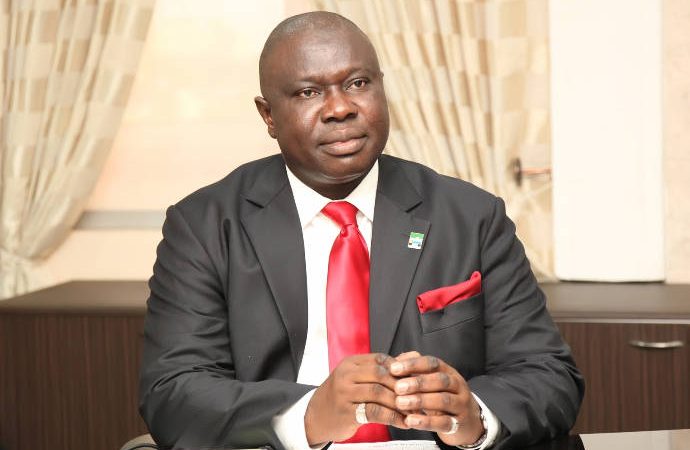By Onyewuchi Ojinnaka
The trial of a former Speaker of Lagos State House of Assembly (LAHA) Adeyemi Ikuforiji on 54 counts bordering on the N338.8 million money laundering could not proceed on Wednesday before Justice Mohammed Liman of a Federal High Court sitting in Lagos Nigeria, due to unforeseen circumstances.
Ikuforiji was charged alongside his former Personal Assistant, Oyebode Atoyebi.
The case which was earlier slated for continuation of trial by 1.00 p.m. could not proceed. Consequently, the matter was further adjourned till November 25 for continuation of trial.
The defendants had maintained their not guilty stance before the new trial judge, Justice Liman and were allowed to continue on the earlier bail granted them in 2012 when they were first arraigned.
At the last adjourned date on September 30, the prosecutor, Mr. Ekene Ihenacho, had called the first prosecution witness, Mr Adebayo Adeniyi, an investigator with the EFCC.
The witness had begun his evidence before the court and is now to continue his evidence on the next adjourned date.
Recall that the defendants were first arraigned on March 1, 2012 before Justice Okechukwu Okeke on a 20-count charge bordering on misappropriation and money laundering. Each of the two defendants had pleaded not guilty to the charges and were granted bails.
However, the defendants were, subsequently re-arraigned before Justice Ibrahim Buba, following a re-assignment of the case. Buba had granted them bail in the sum of N500 million each with sureties in like sun
On September 26, 2014, Justice Buba discharged Ikuforiji and his aide of the charges, after upholding a no case submission of the defendants.
The judge had held that the EFCC failed to establish a prima-facie case against the defendants.
Dissatisfied with the ruling, the EFCC through its counsel, Mr. Godwin Obla (SAN), filed a Notice of Appeal dated September 30, 2014 challenging the decision of the trial court.
Obla had argued that the trial Court erred in law when it held that the counts were incompetent because they were filed under Section 1(a) of the Money Laundering (Prohibition) Act, 2004 which was repealed by an Act of 2011.
EFCC further argued that the Lower Court erred in law when it held that the provisions of Section 1 of the Money Laundering (Prohibition) Act, 2004 and 2011, only applied to natural persons and corporate bodies other than the Government.
The Anti-graft agency had also submitted that the trial judge erred in law when he held and concluded that the testimonies of the prosecution witnesses supported the innocence of the respondents.
In its judgement, the Lagos Division of the Appeal Court, in November 2016, agreed with the prosecution and ordered a fresh trial of the defendants before another judge.
Following the decision of the Appeal Court, the defendants approached the Supreme Court, seeking to overturn the ruling of the Appellate court.
Again, in its verdict, the apex court also upheld the decision of the appellate court and ordered that the case be sent back to the Chief Judge of the Federal High Court for reassignment to another judge.
According to the charge, EFCC alleged that the defendants accepted cash payments above the threshold set by the Money Laundering Act, without going through a financial institution.
The Commission accused the defendants of conspiring to commit an illegal act of accepting cash payments in the aggregate sum of N338.8 million from the House of Assembly without going through a financial institution.
Ikuforiji was further accused of using his position to misappropriate funds belonging to the Assembly.
According to the EFCC, the defendants committed the offences between April 2010 and July 2011.
The offences, according to the EFCC, contravene the provisions of Sections 15 (1d), 16(1d) and 18 of Money Laundering Act, 2004 and 2011











